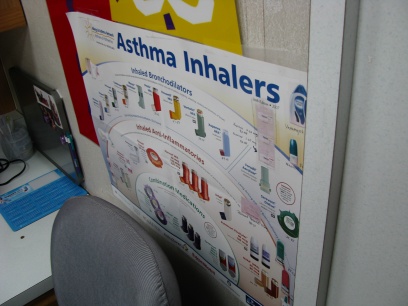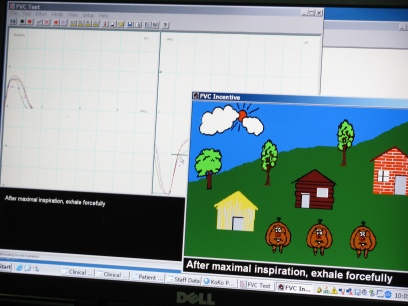Today we begin an occasional series about raising kids in Arizona. We’ll look at some of the benefits and troubles associated with raising children in the state. In the coming months we’ll address issues like safety, education, culture, and this morning we look at a health issue. KJZZ’s Tony Ganzer reports that kids in the Valley sometimes have a hard time finding clean air.
Melvina Perez: “Well I’ve got five kids. I’ve got two girls, three boys and my three boys are in the Phoenix Boys Choir, so we’re running all week long.”
TG: Melvina Perez is a mother and self-described chauffeur, who tries to balance the schedule of her large family, with everyday tasks. But Perez has more to worry about than sports teams or homework, she also needs to worry about medications.
Perez: “Four of my five kids have asthma. With four of them, they all have different symptoms. It’s very hard, because I have to remember not only medicine (in) mornings, nighttimes, and at school–I’m not even there but I have to make sure they get it every day.”
TG: Perez lives in Downtown Phoenix where her family is exposed to many of the problems associated with a big city: lots of traffic, lots of people, and lots of pollution.

Perez: “You can’t let one go outside and play and keep the other four in, and I feel like the bad guy, but in the long-run I’m doing what they need. It’s very hard because they’re not seeing it. And then you’re forcing them to take their medication and they don’t want to take it, but they don’t understand. They really don’t understand that without it they could possibly die…one of them is that bad.”
Owens: “It’s a pretty awful thing when you have to tell a child he or she can’t go play outside because the air is too bad to breathe…it’s not literally that situation, but it’s close to it.”
TG: Steve Owens is director of the Arizona Department of Environmental Quality, or ADEQ. Owens says exhaust, dust and other little pieces of pollution called particulates cause problems for adults and growing kids alike, though the effects on kids are much worse.
Owens: “It’s commonly said that kids aren’t little adults and that’s absolutely true. Even though they have less lung capacity they breathe more air in on a relative basis than adults, and when they get that gunk in their lungs it can stay in there a long time.”
TG: Owens says there aren’t exact numbers of how many children have asthma, though some estimates say as many as 10 to 20 percent of kids in Arizona are coping with respiratory issues. He says the air quality in the Valley is especially bad in winter months when cold air causes air flows that keep pollution over Phoenix, causing a brown cloud, and an unhealthy environment for kids.

(nats kid blowing into machine…bleeps and buzzes)
TG: Beneath the brown cloud, is the team of the Breathmobile…a mobile clinic that serves the Phoenix and Roosevelt school districts in downtown Phoenix. Sherry Hunkler is a respiratory therapist in the Breathmobile.
Hunkler: “And those school districts were picked by zip code. Several years ago Glaxo, a drug company, they did a study called ‘Asthma in America’ and were identifying deaths by zipcode, and actually 85040 and 4-1 and 0-0-6 had high asthma mortality.”
TG: Hunkler says often times schools are built near freeways, and playgrounds are mostly dirt which cause dust, making a child’s ability to find fresh air even more difficult. Along with environment, she says poverty also has a hand in the rate of child asthma…poorer families may not live in the best places.
Hunkler: “Some of the homes when you go into them, it’s like: all the medicine in the world isn’t going to help if you have mold in the walls, and cockroaches, and if you rent sometimes the owners aren’t real helpful.”
TG: Hunkler says the Breathmobile is free, and patients and parents can call for pediatric check-ups as long as the patient is under 19 years of age. Clinic director Judy Harris says in general kids with asthma can live normal lives, if they are treated and monitored on a regular basis.
Harris: “It can be controlled, and by controlled I mean no ER visits, hospitalizations, missed school days, that your child sleeping through the night, they’re active and playful and no side effects from their medication.”
TG: Harris says parents need most to keep an eye on their children, and notice when agencies declare a pollution advisory in the Valley. For mother Melvina Perez, keeping an eye out is second nature.
Perez: “You don’t stop to think about the everyday things like the air and the sun..you just deal with it. I think Phoenix is pretty good, we just need to clean up the air a little bit…okay…a lot.”
TG: The state is making moves to better regulate activities around schools and other sites with children, to keep the air cleaner. ADEQ has an office of children’s health, which monitors company activities like building, or transportation, and makes those companies adjust to reduce impact on kids in the area. School buses are even required to limit their idling times around children. Even with these steps Maricopa County’s air is still too dirty for federal standards, and officials say it will take more concerted efforts before the gunk in the air, is gone.
For KJZZ, I’m Tony Ganzer.


